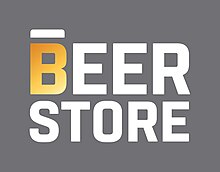 | |
| The Beer Store | |
| Formerly | Brewers Retail (1927–1985) |
| Company type | Joint venture |
| Industry | Beer distribution Beer retail sales |
| Founded | 1927 |
| Headquarters | , Canada |
Number of locations | 420 retail stores; 10 distribution centres; and 8 cross dock locations (2017)[1] |
Area served | Ontario |
Key people | Roy Benin (president) |
| Services | Distribution and sale of beer |
| Revenue | Operates on a break-even cash flow basis. |
| Owners |
|
Number of employees | 6540 (2018) |
| Website | thebeerstore |
Brewers Retail Inc., doing business as The Beer Store, is a privately owned chain of retail outlets selling beer and other malt beverages in the province of Ontario, Canada.
Founded in 1927 as Brewers Retail, it was owned at its inception by a consortium of Ontario-based brewers. It currently operates as a unique open retail and wholesale system primarily owned by three brewing companies: Molson, Labatt, and Sleeman, which are owned by multinational corporations.[3] It is also partially owned (under 0.02%[4]) by 30 Ontario-based brewers.[5] Under the ownership model, all qualified brewers are free to list their products without discrimination and to set their own selling prices,[6] subject to Liquor Control Board of Ontario (LCBO) price approval that must comply with legislated minimum and uniform pricing requirements.[7]
Under Ontario's Liquor Control Act, The Beer Store was formerly the only retailer permitted to sell beer for off-site consumption, other than stores on the site of a brewery, locations of the provincial government-owned LCBO, and LCBO-authorized agency stores in certain smaller communities.[8] The act and the company's articles of incorporation further stipulate that Brewers Retail cannot sell "hard liquor" (spirits) or consumer goods (like groceries). Brewers Retail adopted the current name in 1985.
Amendments made to the Liquor Control Act have since allowed for the sale of single and 6 packs of beer at select supermarkets in Ontario. That was done to enhance customer access and convenience. The Beer Store, however, continues to maintain pricing exclusivity in providing consumers discounts on larger packs of beer, along with retail partners, agency stores, combination stores and manufacturer outlets. What distinguishes the Beer Store is its characterization as a sort of "beer commons."[9] A 2013 Angus Reid survey commissioned by the Ontario Convenience Stores Association found that only 13% of Ontario residents were aware that "The Beer Store monopoly is not a government-owned enterprise."[10][11] The Beer Store operates approximately 450 outlets in Ontario and made a gross profit of about $396-million in 2016.[12][13]
In early June 2019, the provincial government passed legislation to terminate its 10-year contract with the company, six years prior to expiry; continued negotiations with TBS were underway prior to actual enactment of the legislation. This step was a prelude to making beer widely available in variety stores in Ontario.[14][15]
In May 2024, the Ontario government announced an agreement with Brewers Retail allowing beer, wine, cider, and ready-to-mix alcoholic beverages to be sold, before the scheduled end of the master contract, in 8,000 corner stores, grocery stores, gas stations and eventually big box chains in exchange for $225 million in compensation being paid to The Beer Store. Sales in grocery and corner stores began in September 2024. As a result, The Beer Store' s market share is expected to fall from 41% in 2024 to 15% by 2026-27.[16][17]
- ^ Benzie, Robert (November 13, 2014). "Beer Store should pay more to province, says privatization czar". Toronto Star. Retrieved November 11, 2015.
- ^ "THE BEER STORE OPERATIONS REPORT 2017" (PDF). The Beer Store. p. 57. Retrieved October 27, 2018.
- ^ "Ontario to end Beer Store deal, paving way for beer in corner stores". CBC News. May 27, 2019. Retrieved May 28, 2019.
- ^ "THE BEER STORE OPERATIONS REPORT 2017" (PDF). The Beer Store. p. 57. Retrieved October 27, 2018.
- ^ http://www.thebeerstore.ca/about-us "The Beer Store"
- ^ "Master Framework Agreement" Ontario Ministry of Finance
- ^ Flanagan, Greg (February 10, 2014) [www.thebeerstore.ca/.../default/files/pdfs/TBS_AlcoholDeregulation.pdf "TBS Alcohol Deregulation"]. Retrieved May 2, 2017
- ^ "Liquor Control Act (R.S.O. 1990, c. L.18)". ServiceOntario (Government of Ontario). Retrieved May 8, 2013.
- ^ Flanagan, Greg. (2014) [1] Alcohol Retailing Deregulation: Implications for Ontario.
- ^ Regg Cohn, Martin (January 9, 2014). "Beer Store has us over a barrel on wine bottles: Cohn". Toronto Star. Retrieved January 9, 2014.
Angus Reid poll shows a mere 13 per cent of Ontarians — that's barely one in eight people — realize The Beer Store monopoly is not a government-owned enterprise
- ^ Regg Cohn, Martin (December 21, 2013). "Time to liberate our beer from The Beer Store: Cohn". Toronto Star. Retrieved November 11, 2015.
- ^ https://spiritandoak.com/2019/05/03/a-deeper-dive-the-beer-store/, A DEEPER DIVE: THE BEER STORE
- ^ https://www.theglobeandmail.com/news/politics/the-beer-store-everything-you-need-to-know-about-ontarios-lucrative-monopoly/article23248112/, The Beer Store: Everything you need to know about Ontario's lucrative monopoly
- ^ "Ontario to end Beer Store deal, paving way for beer in corner stores". CBC News. May 27, 2019. Retrieved May 28, 2019.
The previous Liberal government signed a 10-year deal with the brewers that permitted an expansion of beer and wine sales to hundreds of grocery stores.
- ^ "CityNews". 680 News. June 6, 2019. Retrieved June 8, 2019.
The bill has not yet been proclaimed into law and Economic Development Minister Todd Smith said the government continues to negotiate with the brewers who own The Beer Store regarding its plan.
- ^ Cite error: The named reference
citywas invoked but never defined (see the help page). - ^ Cite error: The named reference
crawleywas invoked but never defined (see the help page).